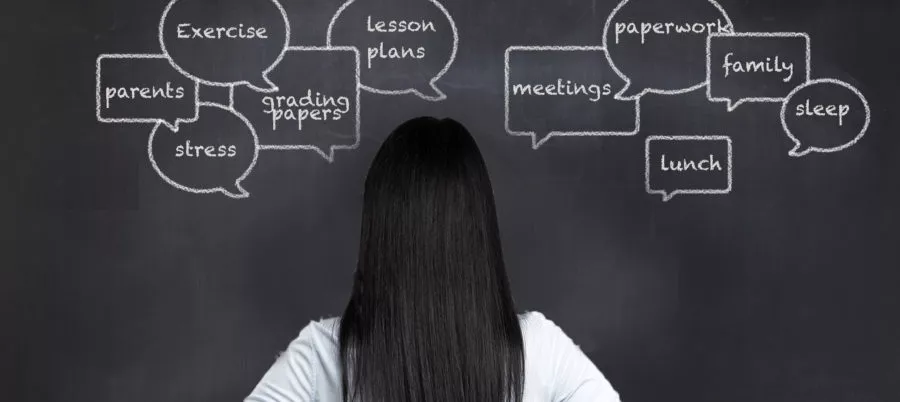 If this school year is your first as a new educator, and you're feeling overwhelmed, you're not alone. The first month or so of school may have seemed like a sprint, but getting through the first year successfully is really a marathon. Keeping a frenetic pace is not uncommon for new teachers, but it is probably not sustainable. October and November are difficult months to get through without making some type of adjustment to how you’re using your time.
If this school year is your first as a new educator, and you're feeling overwhelmed, you're not alone. The first month or so of school may have seemed like a sprint, but getting through the first year successfully is really a marathon. Keeping a frenetic pace is not uncommon for new teachers, but it is probably not sustainable. October and November are difficult months to get through without making some type of adjustment to how you’re using your time.
I'm in my third year in the classroom, and I remember vividly being exhausted and stressed during my first year. I also recall how I (eventually) dealt with it. I learned the hard way, and I see new educators around me now who are struggling with the same issues.
Make no mistake: there are many factors that contribute to this stress and anxiety. You can't necessarily solve this issue by yourself. Still, there are steps you can take.
My philosophy is to act instead of react - a great life philosophy but especially helpful in teaching.
This means setting expectations and predictions for how each day will go, so you're not constantly blindsided by the daily occurrences of teaching. It also involves making deliberate choices about what to prioritize and what to spend your time on.
And you're probably going to have to cut some corners. Right now, you might have more work than you can do. The truth is that you can not accomplish everything that you want to as a first year teacher. In the next few years, you can get closer to getting it all done.
While planning your time and being organized helps you to act instead of react, it's also about adjusting your frame of mind.
Set expectations and predictions for how each day will go, so you're not constantly blindsided by the daily occurrences of teaching. It also involves making deliberate choices about what to prioritize and spend your time on.
In my first year of teaching, I would often plan each lesson the night before, while dealing with the stress or exhaustion of that day. Now I plan lessons up to a week at a time. Instead of asking for help and support when I'm already drowning, now I ask for support when I know I have some sort of challenge or problem coming up. Taking the time to buy lunch on the way to work has been replaced by planning easy and healthy meals (and remembering to bring snacks).
This mindset takes a lot of practice, and I often still slip back into a reactive mode. A few weeks ago, I caught myself at 11:30pm in the midst of a spur-of-the moment grading spree. I'd spent the last hour frenetically grading essays, under the impression that I could somehow grade 10 more before 8am the next day. Once I realized how reactive I was being, I stopped, weighed my options, and chose to go to bed.
Here are some basics on acting more and reacting less as a first-year teacher:
Step 1: Prioritize Your Responsibilities Outside the Classroom
- Rest: Set a bedtime and stick to it.
- Food: Define what healthy eating means to you, and spend time each week stocking up on what you need. You will save time and money by being proactive about food.
- Body: Make time to exercise. Start an exercise club at your school where you go on walks at lunch. Find groupons for cheap yoga studios. Make it a priority to do at least one activity a week.
- Mind: Figure out how to deal with stress. Take up a gratitude practice, or try mindfulness or meditation.
- Family and community: Teaching can be oddly isolating, so make time to hang out with other adults. Have lunch with other teachers, connect with people you care about, and be involved in a community outside of school.
Step 2: Prioritize Your Responsibilities Inside the Classroom
Besides the obvious lesson planning and grading, there’s a lot that can eat up your time during the day: meetings, communicating with parents, responding to emails, student interactions, and so forth.
Teaching can be oddly isolating, so make time to hang out with other adults. Have lunch with other teachers, connect with people you care about, and be involved in a community other than your school.
- Focus your time and attention on the most important responsibilities and then find shortcuts to help you deal with the rest. Next year, you can spend more time on these things, but it’s okay to set limits and not do everything perfectly this year. For example, if classroom management is wearing you down, spend your time planning engaging and structured lessons, and find a way to cut down on grading time.
Step 3: Practice Predicting the Challenges of Each Day
- Spend a quick 30 minutes each Sunday to look at your week. Try to anticipate what’s coming. Do you have meetings? Forms due? Deadlines? Where are there potential pitfalls?
- Anticipate challenging days for your students, and don’t take it personally when lessons don’t go well.
- Evaluate your actions, especially when you’re tired. Make sure you’re not reacting to a problem but you’re intentionally acting in an effective way.
A work-life balance is already hard to obtain, and in the throes of your first year of teaching it might seem altogether out of reach. However, by moving more intentionally through your days and weeks, you can shape your experience in a more positive and satisfying way.
Sara Ketcham is an English teacher at Oakland Technical High School in Oakland, CA. She earned her masters in education from the Multicultural Urban Secondary Education program at UC Berkeley. She is very passionate about teacher collaboration and community.


